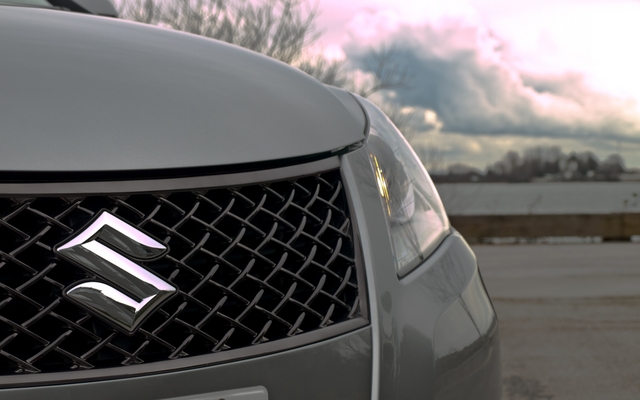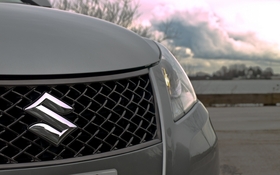2011 Suzuki Kizashi: The Sedan That's Just Right

| Strong points |
|
|---|---|
| Weak points |
|
In a world populated by bland, cookie cutter commuter cars, Suzuki’s have always been standouts. From the odd, three-cylinder, turbocharged Sprint to the four-wheel drive SX4 to the company’s tiny, Jeep-like LJ80, Suzuki has perpetually marched to the beat of a different drum.
And so it is with this new Kizashi. Although fomally known as a mid-size sedan stuck sharing its market segment with the powerhouse Accords and Camrys of the world, the Kizashi is immediately different from those behemoths by virtue of its smaller size. However, at 183 inches long, it’s also a wee bit larger than the diminutive Civic, Mazda3, and VW Jetta. But you wouldn’t need the measuring tape to tell you that. With sheetmetal that looks like it’s been stretched over the Kizashi’s frame, it doesn’t carry the same visual weight as blobby Camry and Accord, but looks larger than the small-car competition thanks to the aggressively flared fenders.
Thus it comes as no surprise that the interior dimensions are, just as you would suspect, somewhere in between all of those vehicles. Width, although being somewhat constricted by the car’s narrow waist and barrel-shaped doors, is still ample in both the front and rear seats, and the deeply scalloped interior door panels help add a few extra inches of elbowroom on top of that. Additionally, legroom was fine for front- and rear-seat passengers alike, but was slightly less than you would find in the larger Camry and Accord.
However, it was the fit and finish of the Kizashi’s interior that I found particularly intriguing. Absolutely without equal at this price point, the function-over-form layout is hands-down the most robust interior I’ve seen, full stop. From top to bottom, the materials used feel excellent to the touch and are some of the hardest wearing you’ll find. Take, for example, the centre stack. Well laid out in a logical fashion that takes absolutely no time to figure out, the whole shebang is finished in a wonderfully tactile soft rubber finish that cleans easily, hides fingerprints, and prevents squeaks and rattles. Similarly, the dashboard, itself constructed on a pebbly foam rubber superstructure, is nice and soft to the touch, wipes down easily, and also prevents adjoining panels from producing any wayward noises. Push against either of these components with all the strength a reasonable human being can muster, and you’ll find not even a smidgen of movement; something not many other cars can claim. It’s almost as if the interior was hewn from a single piece, rather than an assembly of pieces.
But, if this layout has one detractor, it may be that it’s too simple. Without the fancy lights, glossy black trim, and dazzling button layouts you get in something like a Civic or Volkswagen, there’s no denying that the Kizashi’s interior lacks the curb appeal of the competition’s. However, once you get past the bland appearance, there’s plenty of substance to be found. Features not often associated with such affordable automobiles, like dual zone climate control, heated seats, push-button start, iPod integration, and a full suite of steering wheel-mounted controls can all be found within the Kizashi, albeit without the fanfare you’d expect. And even better still, all those features are ridiculously easy to operate.
But, of all the simple switches and buttons to be found, my favourite is the one that resides to the left of the steering wheel and shares an innocuous binnacle with the fog lights and parking assist system switches: the all-wheel drive button. Engaging Suzuki’s Intelligent All-Wheel Drive (i-AWD) system, the switch allows up to 50% of the available torque to be shuttled rearward as is needed, just as it does in the smaller SX4 crossover. However, in the Kizashi sedan, the system is augmented by the inclusion of Suzuki’s intelligent Vehicle Stability Program (i-VSP) that also moves power from right to left as well, in an effort to combat under- and oversteer conditions as they arise. Having tested the system in everything from dry to snowy conditions, I can vouch for its sure-footedness in every situation. Duking it out with big, heavy, wet piles of snow between lanes at highway speeds, the system worked quickly enough that lane changes could be made with the utmost confidence that the Suzuki wouldn’t stray from its intended course. In the dry, the system gave the little-ish sedan a sense of nimble capability that just can’t be matched by front-wheel drive only vehicles.
Although Suzuki’s production schedules and dealership network undoubtedly wouldn’t support Kizashi sales on the scale of the Camry or Accord, this new mid-size sedan reminds me of precisely why those eminently popular family sedans are where they are today: practicality. Not so big so as to be daunting in girth, and not so small as to be cramped, it’s no coincidence that the Kizashi’s dimensions are almost identical to the Camry’s and Accord’s of yore. But although Toyota and Honda both seem to have lost the proverbial beat as late, it would appear that Suzuki’s continued allegiance to marching to a slightly different one has finally paid dividends in the form of the Kizashi. Incredibly well made, insanely well executed, and capable on a scale that few family sedans can match, the Kizashi is a vehicle that ticks nearly every box for the average Canadian family, and a car that I sincerely hope finds it’s foothold in the market because, as Goldilock’s would say, this one is just right.











